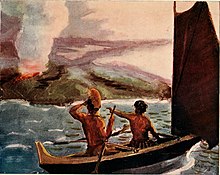Hiʻiaka (mythology)
Hiʻiaka is a Hawaiian goddess. She is the daughter of Haumea and Kāne and the patron goddess of the hula dance. Hi'aka had 12, in some stories 40 sisters.
The moon Hiʻiaka of the dwarf planet (136108) Haumea was named after her.
The best-known legend about Hi'iaka is the story of her, her sister, the volcano goddess Pele , and Pele's lover Lohiau. Hi'iaka was sent to Kaua'i by her sister Pele to get Pele's lover Lohiau. (It is 350 miles from Hi'iaka's house in Lehua Forest in Puna, east Hawai'i, to Lohiau's home in Ha'ena, north Kaua'i.) But Lohiau had died of lovesickness, and it took Hi'iaka either ten days or a month to get him to bring it back to life. That's why she couldn't come back to Pele after 40 days at the latest. The very impulsive Pele became jealous and burned Hi'iaka's forest and Hi'iaka's lover Hopoe to it. But Lohiau, who had returned to life, had forgotten Pele through his death and immediately fell in love with Hi'iaka.
When Hi'iaka returned home and saw the destruction, she became angry with Pele and decided to give in to Lohiau's courtship. When Pele noticed this, she sent a stream of lava over the lovers, but Hi'iaka was immortal and only Lohiau was burned. Now Hi'iaka was really angry with her sister. She began to smash the volcanic crater and called Pele's enemy, the sea goddess Nā-maka-o-kahaʻi ("the eyes of Kahaʻi"), to flood the crater. (This older sister of Pele had once banished Pele from Tahiti .) Then Pele saw what she had done and asked Hi'iaka's companion, Wahine-o-mao, to appease Hi'iaka. She achieved this by suggesting that Lohiau's soul be found and brought to life a second time. After this long ceremony, Pele's anger was gone. But Lohiau and Hi'iaka got fed up with Pele and went back to Kaua'i, where they lived happily until Lohiau's natural end.
Individual evidence
- ↑ Manfred Miethe: Märchen aus Hawaii , edited and newly translated by Manfred Miethe, Krummwisch bei Kiel: Königsfurt Verlag, 2007, pp. 171–176.
